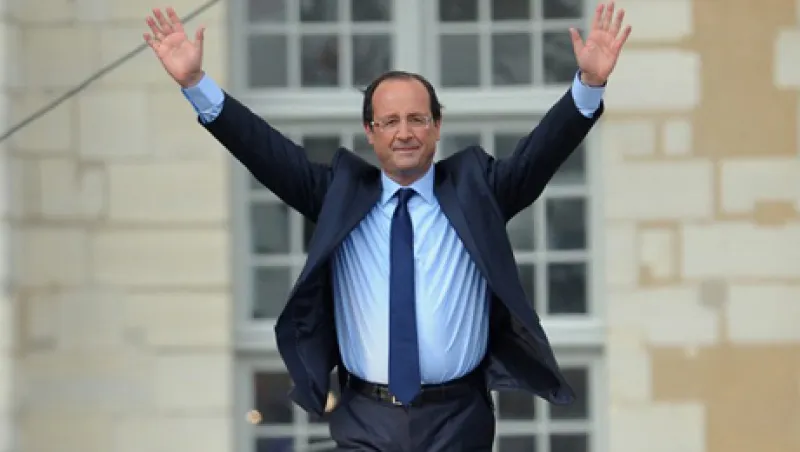Nicolas Sarkozy pushed through France’s pension reforms in 2010, but it was a hard-fought battle.
Plans to increase the retirement age from 60 to 62 were bitterly opposed by the labor unions through a series of well-attended strikes, but the French president knew there was too much at stake for him to give in. France has not enjoyed a budget surplus since 1974 because of high public spending, and unusually high expenditure on pensions has contributed greatly to this persistent structural deficit. This made the increase in the retirement age an important triumph in France’s search for fiscal soundness — which has become even more urgent since 2010.
But now this achievement is at risk of unraveling — raising questions about France’s ability to control its high government debt. François Hollande, the Socialist candidate and clear frontrunner in the race to become French president, has said he will restore the retirement age to 60. In the first round of the election, held Sunday, he polled 28.5 — compared with 27.1 percent for Sarkozy, who belongs to the center-right Union for a Popular Movement Party. But in the second and final round — on May 6 — Hollande is expected to win by a wide margin.
Analysts had long argued that France’s retirement system needed to change. Figures from the 2011 Pensions at a Glance report by the Organization for Economic Cooperation and Development (OECD) show public spending on pensions at 12.5 percent of gross domestic product (GDP), compared with an OECD average of only 7.0 percent. Even after allowing for the rise of the retirement age to 62, the report suggests this figure will climb to 14.2 percent by 2050 — still well above the OECD then-average of 11.4 percent. This suggests there is a case for further increasing rather decreasing the retirement age: It will, even after the climb to 62 has been fully phased in from 2018, be low by the standards of many advanced economies.
The early retirement age also hits public finances by depressing GDP, since it takes a huge number of people in late middle age out of the labor market while they are still healthy. The OECD report found that less than one fifth of Frenchmen in their early 60s were in work or looking for work, compared with a rich-country average of more than half. Before Jacques Chirac stepped down as president in 2007 to make way for Sarkozy, it was said only half in jest that the man in the Elysée presidential palace was the only septuagenarian in France still working.
The Fifth Republic’s retirement remedies have received the warm approval of the International Monetary Fund (IMF). The IMF is greatly concerned about the risks to financial stability that pensions pose — remarking in its latest Fiscal Monitor, published Tuesday, April 17, “Containing the increase in pension spending remains one of the key challenges on the long-term fiscal agenda.” However, it added that France was one of a number of advanced economies that “are aggressively tackling pension reform.” The whittling down of unrealistically generous state pension benefits has been seen by analysts as one of the key achievements on the road to fiscal sustainability for several euro zone member states as well as France — in particular Italy.
Against this background, analysts have expressed fears about what the repudiation of pension reform means for French finances — particularly given France’s historically high public spending in several other areas, such as health. In response to Hollande’s pronouncements on pensions and other costly commitments made in the heat of the election seasons, J.P. Morgan Asset Management warned earlier this year, “Mr. Hollande has said a variety of profoundly discouraging things in the context of French public finances, among which are a desire to lower the pension age.”
The history of the euro zone debt crisis has shown that it is but a short step from concern to outright terror about a country’s high debt. Last year the market balked at France’s gaping fiscal deficit (projected by the IMF to be 4.6 percent of GDP in 2012, compared with a euro zone average of 3.2 percent), and large stock of outstanding debt (high by historical standards at 89 percent of GDP, though close to the euro zone average).
Proof of how quickly panic can arise came late last year, when fears about France’s fiscal position rapidly pushed up French government 10-year yields to a November peak of 3.82 percent, before the announcement of emergency fiscal retrenchment by Sarkozy eased rates down again. As European trading closed on Friday, they were 3.09 percent.
Shortly before Standard & Poor’s downgraded France’s debt from AAA in January, France and the U.K. became embroiled in an unusual, and faintly comical, war of words over which country deserved more deeply to lose its top-notch credit ranking. If the Fifth Republic’s retirement changes are undone, the issue of pension reform will become a clear point in the U.K.’s favor should this argument be resurrected. After progressive increases, its state pension age will be 68 by the mid-2040s — though how many nations will still have their AAA status by then is anyone’s guess.






